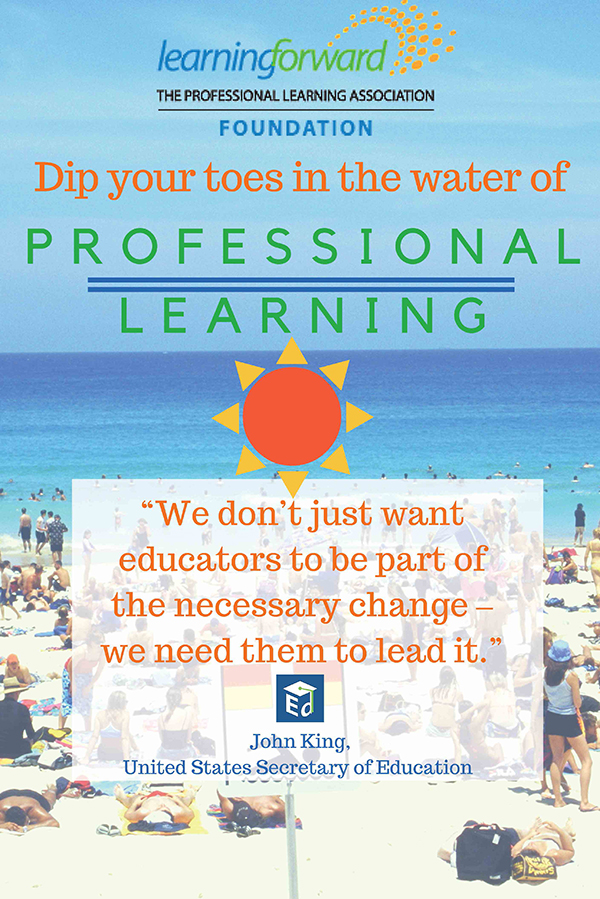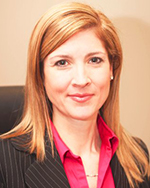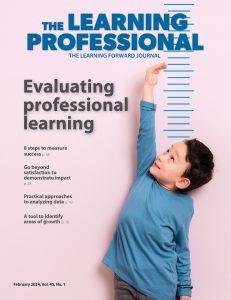It’s summertime and vacation season is in full swing! Often all it takes is one brave soul to jump in the pool or ocean before everyone joins in the fun. The same thing happens in education – all it takes is one educator dipping their toes into the waters of professional learning to impact a whole school or district.
The Learning Forward Foundation believes in the value of educators’ leadership. As United States Secretary of Education, John King, recently said, “We don’t just want educators to be part of the necessary change – we need them to lead it.”
Anna Jackson, Director of Leadership and Professional Development for Lubbock Independent School District (LISD), Lubbock, Texas, is an educator leading change in her district. Jackson is this year’s district-based recipient of the Learning Forward Foundation Academy Scholarship, which provides funding to support participation in the Learning Forward Academy for one school-based practitioner and one district-based practitioner. The purpose of the scholarship is the development of leadership in the field of professional learning. Scholarship goals are to provide Jackson with time and expertise in constructing the knowledge and developing the skills and courage to solve significant problems related to student learning, thereby transforming professional learning within her organization.
Through the Learning Forward Academy, a two-and-a-half year learning experience, Jackson will engage in high-quality professional learning practices with educators in similar roles and situations to clarify, study, and solve authentic problems related to student learning in schools.
Lubbock’s district plan
Through analysis of data and resources it has become clear that LISD is rich in learning opportunities developed using best-practices and aligned across all levels, yet they do not see high levels of implementation in the classroom. Jackson’s plan focuses on (1) enhancing the level of transfer from knowledge to application, (2) effectively assessing levels of implementation using multiple data sources and (3) using findings to provide effective feedback/modify adult learning.
The goals
By December 2018, LISD will develop a systemic process for measuring levels of implementation of district professional learning initiatives in classrooms and use that data to create strong systems of support for implementation in order to close the knowing/doing gap. These efforts will lead to a higher number of teachers who are “green” on value added indicating higher levels of student progress as well as an increase in math and reading scores on the State of Texas Assessments of Academic Readiness. Improvement goals will be aligned with the district goals once new data is available.
The outcomes
Accomplishing these outcomes will improve student learning, which is the primary goal of our work, and will also create greater depth in teacher knowledge. This year LISD was audited by the Texas Association of School Administrators. This audit, along with a SWOT (strengths, weaknesses, opportunities, and threats) analysis conducted with an advisory committee, strongly suggested that this was an important issue. Language from the audit findings stated that “overall, the professional development program implemented in the Lubbock Independent School District offers a wide variety of activities but lacks sufficient system-wide focus and coordination to improve the delivery of curriculum or impact student achievement.”
Based on this data, Jackson’s theory of action is that “If we create intentional systems of planning professional learning, assessing implementation in the classroom and measuring outcomes on educator effectiveness then student progress and performance will increase.”
The evidence of impact
The evidence that will demonstrate the outcomes have been accomplished will be higher value added data for teachers and higher achievement data for students.
Specific behaviors that we expect to see include, but are not limited to:
- Evidence of skills and behaviors addressed in professional learning in 95% of classes (based on walkthroughs, focus walks, and instructional rounds data);
- PLC evidence of application of skills and behavior as demonstrated in teacher lesson plans;
- Evidence of effective practice as evidenced by anchor charts documenting strategies (posted in classrooms); and
- Anecdotal record of implementation as evidenced by teacher, Campus Academic Leader, Instructional Coach and Administrator survey results.
Learning Forward Foundation Scholarships
The Learning Forward Foundation scholarship contest encourages educators to put their good ideas into action and apply their research and creativity to impact education’s most profound challenges. Learn more or donate to the Learning Forward Foundation scholarships and grants.








